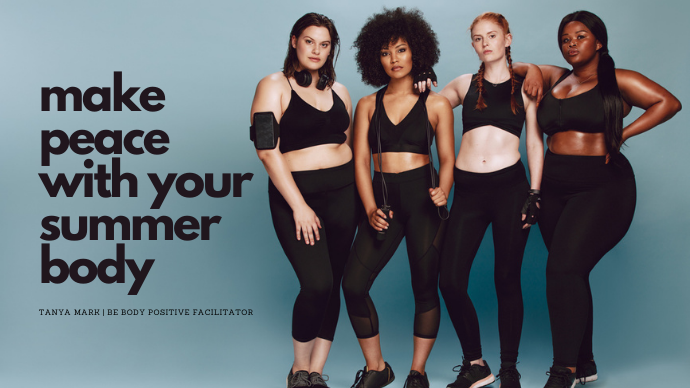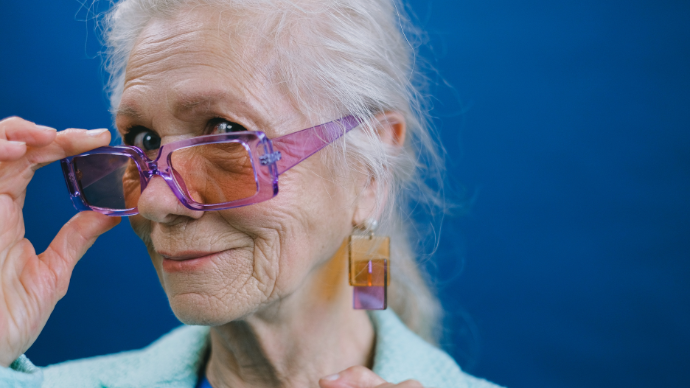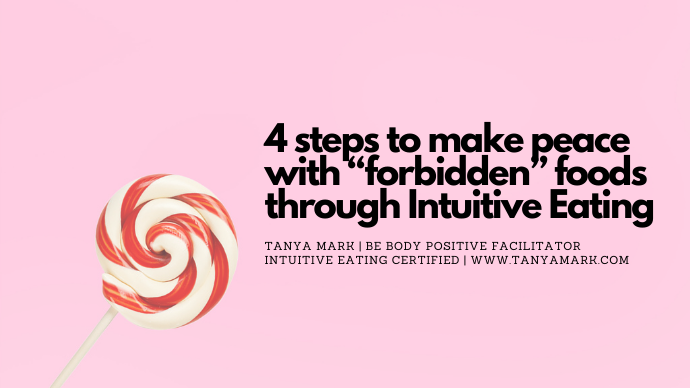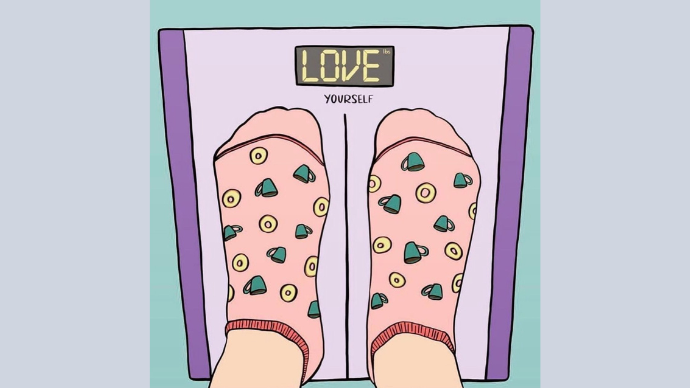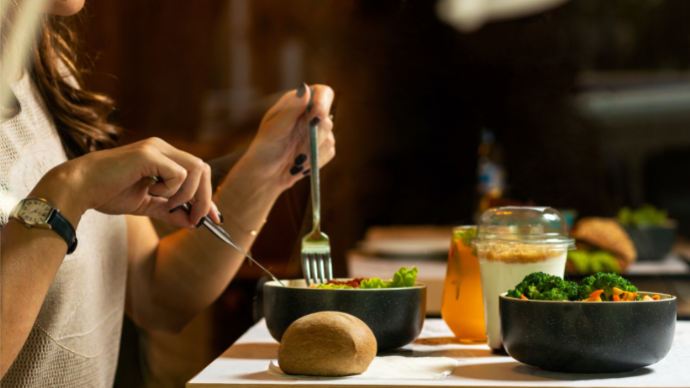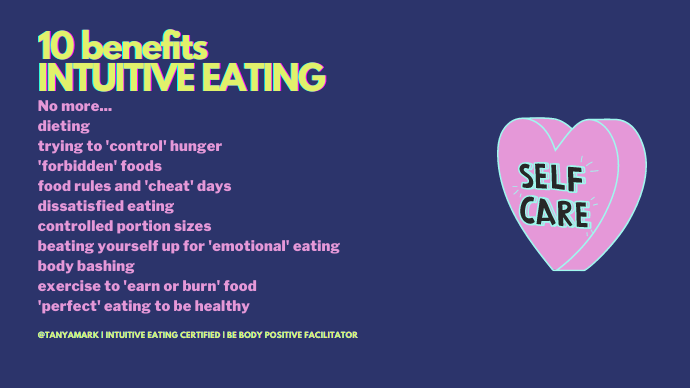Do you love the idea of ditching your scale, but you’re worried about your weight?
If so, you’re not alone. You’ve been taught to focus on your weight (like all of us) – with your BMI number labeling your supposed health status.
And holy moly, as a culture, we spend enormous amounts of time, energy and money focused on weight and worried about what we see in the mirror.
So first, let’s honor that it’s freakin’ hard to live in this perfectionist body culture.♡
Next, I know that you wouldn’t be a part of my community if you didn’t care deeply about your health. Yet you may not know how to take care of your health without focusing on the scale.
Perhaps…
✔️ You’ve been focused on weight loss for a long time and maybe you’ve had some “success” but then you worried about gaining it back. And sure enough, when the diet or food plan ended or you found being hypervigilant with food and/or exercise just got plain exhausting, or life got in the way (because you are an actual human being) – you, like most people, gained it back and maybe more. This is not your fault, my lovely friend. Diets are not designed to be sustainable long term.
OR
✔️ You’re stressed about maintaining your current weight – berating yourself anytime there’s a scale fluctuation. And you too, my friend, it’s not your fault either because weight has been a proxy for health and no body talks about how weight fluctuations are normal. So no wonder you worry.
If not scale focused, what can you do to take care of your health?
You can take the approach I took with my current client, Maureen (and all my clients).

Here’s a shout out to Mo – who is always smiling!
“Mo” was dissatisfied with pandemic weight gain when she started her coaching journey with me. I deeply respect body autonomy. So only Mo gets to decide what’s best for her body. I never dismiss her (or anyones) desire to lose weight.
Instead, I shared with her my reasons for not focusing on her weight and how this approach would make her healthier and yes, much happier 😊 along her well-being journey. You can read Mo’s full story, in her words below in the P.S.
What’s the approach?
It’s taking care of yourself.
“Uh duh, Tanya. That’s what I’ve been trying to do!”
But has your self-care been focused on the number on the scale?
♡ What if your self-care wasn’t about self-control or “shoulds?”
♡ What if you didn’t have to use willpower to white-knuckle it to “be good” and restrict your favorite foods?
♡ What if you put the scale aside and practiced self-care from a place of self-love (instead of body hate or fear)?
TRUTH BOMB: Focusing on your weight can get in the way of you taking care of your whole self, in your unique body.
3 Reasons To Set Your Scale Aside & Get Healthier
#1 Your weight and BMI are not the best indicators of your health.
♡ Consider a woman in the “normal” BMI range and looks “fit” yet she struggles to eat well and move her body because of lack of time, money. She smokes to “deal with” stress and isolates herself. A doctor could miss helping her improve her health if she isn’t asked about her behaviors and life circumstances.
♡ Consider a young man in the “o” BMI category. His behaviors with food and movement are terrific, as are his health labs, yet he’s considered unhealthy by BMI numbers.
♡ Consider a woman in her sixties who falls in the “underweight” category who might be praised by friends and family for “being good” with food and exercise, yet her behaviors are disordered.
It’s kind of a mess, right?!
We know that people can be healthy across the size spectrum. I have patients that are ‘normal BMI’ that have Type 2 diabetes. And I have patients that are well above ‘normal BMI’ that don’t have any health problems. If you hide their weight, if you just compared their labs to each other, you’d think the person with the poorer labs was the heavier person. It’s not always true. – Dr. Gregory Dodell, Central Park Endocrinology, New York City – January 3, 2022, USA TODAY article – Everything you miss when you think weight is about willpower.
So numbers don’t mean what you think they mean.
You could be healthier at a lower or higher weight or maybe you’re already at your healthiest weight range (even though you, diet culture or your BMI label says otherwise).
Want to read more about BMI? The Myths of BMI Can Hurt Your Health
And by the way, weight fluctuations are normal. If the number on the scale goes in a direction you don’t like, it can unnecessarily make you feel crappy about yourself and send you spiraling back into “diety” behaviors – restricting, controlling, “shoulding” on ourselves. No bueno (good)!
That’s why an important part of learning Intuitive Eating (one of my favorite non-diet nutrition tools) calls for setting the scale aside because it gets in the way of you being able to listen to your own body’s signals with hunger, fullness, satisfaction and more!
Ok, let’s move on to the next important reason why you should take the focus off your weight.
#2 Weight is not a behavior
Research shows that it’s your self-care behaviors that impact your health and longevity not your weight class (BMI). This makes a lot of sense especially after reading the above real life stories.

So how are your self-care behaviors?
Are you taking care of yourself from a place of self-love? If so, great! ✰✰✰✰✰ (5 stars for you)!
But maybe, like all of us, you get in self-care ruts. (Yes, this includes yours truly 🤚). So first, please, please be kind and compassionate with yourself.
Maybe you didn’t sleep well and you’re exhausted, but you feel like you “should” get up early before work to exercise. (FYI, it’s better for your body to get rest than force a workout, yes, really
Then because you’re tired, so you crave carbs, sweets (check out: Why Am I Craving Carbs, Sugar) and then you beat yourself up over it. And when you get home, you order takeout because making dinner just takes waaaaay too much bandwidth.
Or maybe you just started a new job; you’re going through a divorce; you’re caring for an elderly parent or pet or you have to shuttle your kids to a zillion different activities; or you’re injured or ill; or you’re struggling with a mental health challenge and the list goes on……..
Often, your self-care rut is caused by a **combination** of things!
The best part of taking a self-love approach to self-care is that it’s flexible and you!!! get to choose what feels “doable” because you know yourself best. Period. I can’t stress enough how critical personal autonomy is to your success. Nobody likes to be told what to do – even if you think that’s what you need. I promise that you are full of wisdom. My job is to help you bring it forward.
Maybe you start with a gentle improvement to your eating habits, or moving your body in ways that you enjoy, or going to bed earlier, or having the wine a few nights instead of every night, or winding down with hot tea instead, or learning stress management techniques to calm your nervous system, or carving out time to connect with others, or making time for fun, or maybe learning to separate your self-worth from a scale number?
Focusing on the scale can be such an unnecessary strain on your health (which may already be super stressed – so let’s not add to it)!
#3 Your health is complex
Let me tell you two stories to illustrate the many factors that influence your health:
♡ Consider a woman with a higher weight (BMI) who lived healthfully into her hundreds. She drank a couple cocktails and ate fried food daily, smoked, did little to no exercise. But…she slept great, was super social, had little stress, had tons of friends, and a lovely family that adored her and she adored them.
♡ Now let’s consider a man who had a “ideal” body weight (BMI) and lived the life of health as a personal trainer and was “perfect” with his food. Yet he was a stressed about lots of things including maintaining his physique. He ate “healthfully” – but out of fear of getting a disease or gaining weight; he declined social invitations to workout or avoid the “unclean” food at the dinner party. Sadly, he died from a heart attack in his thirties. (His “health” background sounds similar to mine).
Why did one out live the other?
There are waaaay too many factors to consider, but the main point I’m making here is that weight isn’t one of them.
To summarize, the 3 reasons to set the scale aside are:
- weight (and BMI) are not the best indicators of your health
- behaviors are far more impactful
- and your health is full of complexities.
So together, we (like I did with Mo!) will focus on your self-care behaviors and all the factors that influence your health and well-being, while allowing you to live your best life (and not feel guilty for simply enjoying an ice cream cone). And ultimately, trusting your body weight to settle where it’s healthiest for you. (And don’t worry, if you struggle with body image, I’m here to support you with this too)!
♡ How does that sound dear reader? Reach out and let me know! T
P.S.🤩 Here’s what the lovely “Mo” has to say about her well-being journey:

“I am fortunate to have found Tanya’s coaching services.
After 20+ years in a fast paced and high-pressure career it took the pandemic to “wake me up” to the fact that my version of wellness was not effective nor sustainable.
After two years in a toxic work environment, I found myself burned out, stressed, anxious, irritable, experiencing weight gain, relying on prescription meds and just an overall lack of joy in life. This overall sense of fragility led me to research and engage with a well-being coach.
I chose Tanya over other providers because I wasn’t looking for traditional therapy or psychology nor was I uneducated about health and wellness. Tanya provided a holistic all-encompassing approach that leveraged the tools I already had at my disposal. I felt Tanya was able to customize her coaching based on my life stage.
♡ There were no rigid rules but a journey that felt organic and customized to my needs.♡
Each week Tanya listened to my needs and empowered me with digestible knowledge based on current science in a range of fields. It was with that information I could adventure out in life experimenting with what worked best for me. Tanya supported me with accountability and creative solutions along the way.
No matter what your well-being goal is, feel confident that Tanya is proven, licensed and offers versatile programs for a wide range of client needs.
After just a short time partnering with with Tanya for weekly coaching, I have benefited from the following results in seven months: improved strength and mobility, reduced aches / pains, improved body composition, menstrual cycle and elimination of PMS symptoms, stabilized mood, reduced anxiety, minimized stress and improved sleep and my nervous system, improved work life balance resulting in a fulfilled life — eventually eliminating previously prescribed meds.
Having Tanya as a virtual coach was easier and more rewarding than I expected and has led me to truly embrace flexible self-care and overall life satisfaction! Thank you Tanya – I don’t know what I would have done if I hadn’t met you!” – Mo Lang
♡♡♡ Thank you, thank you, thank you Mo, for these kind words! (It’s such a JOY! to be working with Mo by the way).
And if you’re curious about coaching and how we can work together to reach your goals, click here to discuss long term deep health coaching and/or book your first session. ♡ Tanya



